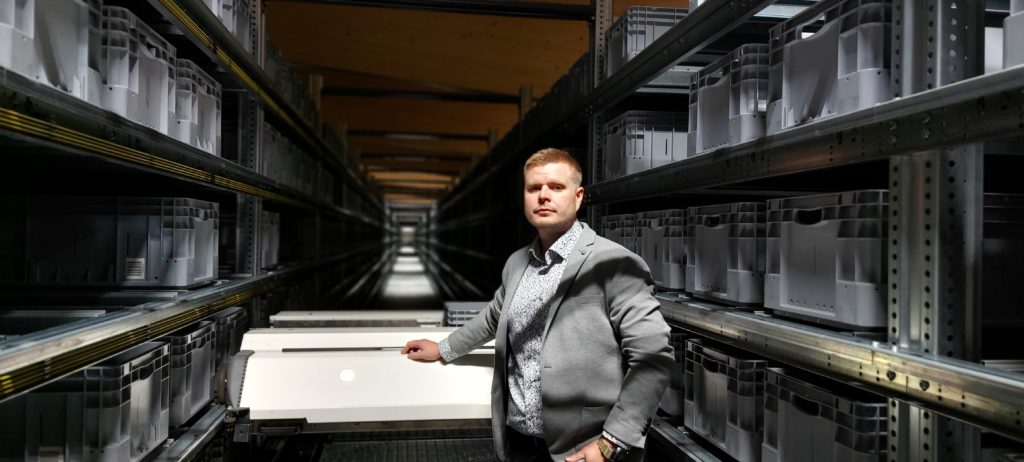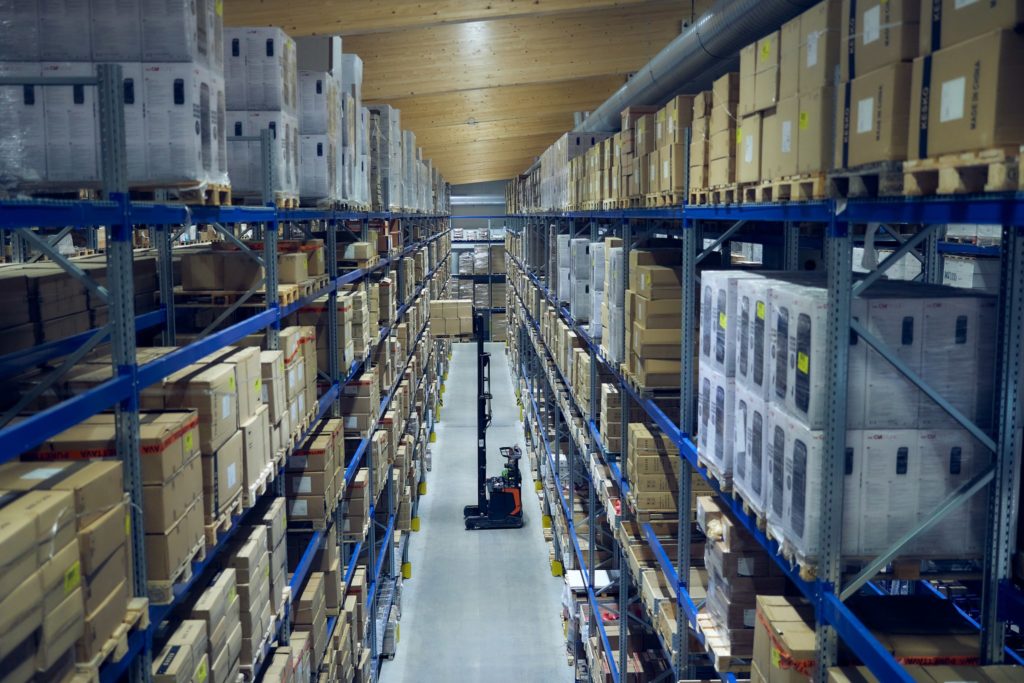Outsourcing measures are often strategic decisions, so they are worth considering from both an operational and a financial perspective. Outsourcing warehousing can achieve a lot of positive results, say Jouko Lehtonen, HUB’s Business Director, and Markku Valpas, CFO.
Outsourcing is a growing trend as companies seek to save money and improve the efficiency of their operations. Storage and related processes are core activities for very few companies, making them a natural and attractive target for outsourcing.
What does storage outsourcing mean?
What is storage outsourcing really all about? We asked HUB’s Business Director Jouko Lehtonen. Or actually he shies away from the word “outsourcing”, because, in his view, it is about a broader change in thinking and the way of working.
– Instead of outsourcing, I prefer to use the term contract logistics. In other words, we offer the client a service to produce a jointly agreed package. Or to put it the other way round: we strive to respond to a client’s problem or need with customized solutions.
Jouko Lehtonen stresses that when talking about warehousing, one should not limit oneself to discussing storage space and shelves. Modern warehouses are first and foremost processing centres, where numerous value-added services are also provided, such as labelling, pre-assembly, testing, assembly, product finishing, preparation of sales presentations and kitting.
– As a rule, a warehouse should not be a place where goods are stored. Although in the background is the warehouse, we provide a service and a process that moves the goods through the warehouse as smoothly as possible and specifically according to the client’s needs. The faster and more efficiently the goods pass through the warehouse and the more added value it can produce in the process, the better, Jouko Lehtonen continues.
Smooth, fast and efficient processes are the result of specialisation and expertise.
– For the client, logistics is just part of a larger entity, while for us it is the main business, which brings a lot of benefits to the client. All of the digital and IT solutions we use, for example, are made specifically from a logistics perspective, so the client always has access to the best technology in the industry,” says Markku Valpas, CFO of HUB.
The main benefit of outsourcing is flexibility
Whether it’s outsourcing or contract logistics, there are many benefits for the client company, and according to Jouko Lehtonen, flexibility is second to none.
– Flexibility is definitely the biggest advantage. Our services are always scalable to client needs, be it changes in business operations, seasonal peaks or daily fluctuations, Jouko Lehtonen sums up.
Outsourcing usually comes into play when there are changes in the business operations. If the business grows significantly, its own properties and warehouses or staff could become a bottleneck. On the other hand, if the business shrinks, the old premises and staff may be unnecessarily large in the new situation. Also, the restructuring of the core business, such as the sale of certain functions, can lead to a situation where it no longer makes sense to produce the remaining entity in-house.
In warehousing, the level of activity usually varies quite a lot. When a company buys warehousing as a service, it does not need to calculate its own capacity for peak periods. Markku Valpas also sees the predictability of costs in relation to volumes and their fluctuations as a major benefit.
– Warehousing is always about unpredictable bursts, and in these types of sudden changes, outsourcing brings peace of mind when the cost level is always relative to the bursts of activity. In your own business, you have to pay the costs, whether there is work or not.
Jouko Lehtonen points out that freedom of choice is an essential part of flexibility.
– Outsourcing your warehouse does not necessarily mean that you have to give up everything, as you can tailor your service package to exactly what is sensible and appropriate. For example, you can transfer your intermediate storage, your seasonal storage or just your e-commerce storage to us and keep your wholesale or critical production storage yourself.
Jouko Lehtonen also encourages people to consider when they last modernised or renewed their own storage facilities.
– At some point, old storage facilities or systems inevitably come to an end of their lifespan. This is a good time to consider whether to should invest in modernising your facilities and systems yourself, or whether it would be better to outsource your storage services to a dedicated professional.
Outsourcing also makes sense from a financial point of view
Outsourcing warehousing generates cost savings for the company, which are generally achieved in three ways. On the one hand, the company can focus on its core business and direct resources to more productive activities than running a warehouse. On the other hand, savings are made when operations and processes become more efficient when taken care of by a company specializing in logistics and warehousing. In addition, when fixed costs become variable costs the company does not need to pass on the fixed costs of unnecessarily high capacity to its cost structure.
When considering the cost of warehousing, it is also worth bearing in mind the hidden costs that are not always taken into account. When outsourcing, for example electricity, heating, insurance, property maintenance, security, system costs and system development costs are included in the service.
Markku Valpas also wants to highlight the benefits of outsourcing from an accounting perspective, as outsourcing has a positive impact on many key performance indicators.
First, outsourcing lightens the balance sheet, as the amount of capital employed is reduced as fixed asset investment decreases.
– Outsourcing improves ROI (Return on Investment) -based profitability figures. When the capital employed decreases, the return on capital is also better, if the company’s performance remains otherwise unchanged,” says Markku Valpas.
Banks and financiers are very interested in the indicators related to liquidity and debt service capacity. Outsourcing also has a positive effect on them.
– Outsourcing improves the equity ratio as the balance sheet total decreases, says Markku Valpas.
Outsourcing can also have a positive impact on cash flow if the company is able to sell or rent out its own assets.
Working with a partner – the control is in your hands
There is sometimes a fearful attitude towards outsourcing, with people thinking that if the activity is not in their hands, it is not properly controlled. Jouko Lehtonen urges you to forget such worries.
– Reporting is seamless. We always have system integration with the client’s systems, so the client has full transparency at all times about what products, which brand names and how much they have in stock.
The client also gets real-time information on how well the processes are running.
– Our starting point is that we produce quality metrics for our clients transparently through BI systems. The client can see all the time what our quality has been and what the current throughput of our production is, Jouko Lehtonen explains.
All reports are reviewed in regular weekly and monthly meetings, where, in addition to monitoring, the focus is on improving operations.
– We also deliver continuous process and operational improvement for the client. Together we are looking for ways to improve efficiency. There are things the client can do and things we can do, but both benefit when cost efficiency or productivity is increased,” says Markku Valpas.
The quality of service is ensured by a Service Level Agreement, which defines not only the capacity and service level, but also any permitted deviations.
– For us, the SLA is always the common thread that guides the services we deliver to our clients. What we promise, we deliver. After all, the continuity of our business depends on our clients being satisfied and wanting to continue working with us. Then client promise is the be-all and end-all, Jouko Lehtonen sums up.


Five benefits of outsourcing storage
- Services can be flexibly scaled according to your needs.
- The partner will manage the resourcing and ensure sufficient capacity even during peak periods.
- Capital is not tied up in premises, equipment, systems or staff.
- The partner’s system and process expertise improves efficiency and accuracy.
- You can take advantage of the wide range of value-added services offered by your partner.
Five advantages of outsourcing from an accounting perspective
- The balance sheet becomes lighter, and investment or financing needs are reduced.
- ROI-based metrics improve.
- The equity ratio improves.
- Fixed costs become variable costs, increasing flexibility and operational efficiency.
- Cost allocation is made easier, increasing transparency and making pricing more accurate.



